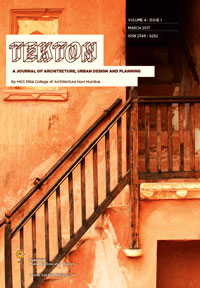Suneela Ahmed and Rahat Arsalan
Tekton
Volume 4, Issue 1, March 2017
pp. 66 – 79
 Suneela Ahmed is Assistant Professor at the Department of Architecture and Planning, NED University of Engineering and Technology (NEDUET) Karachi, Pakistan. She received her PhD from Oxford Brookes University, UK in 2016. She has bachelors in Architecture form Indus Valley School of Art and Architecture, Karachi and a Masters in Urban Management from University of Canberra, Australia. She has been involved in local and international urban planning and design research. She has also participated in national and international conferences and symposia and has authored and contributed to urban and architecture publications.
Suneela Ahmed is Assistant Professor at the Department of Architecture and Planning, NED University of Engineering and Technology (NEDUET) Karachi, Pakistan. She received her PhD from Oxford Brookes University, UK in 2016. She has bachelors in Architecture form Indus Valley School of Art and Architecture, Karachi and a Masters in Urban Management from University of Canberra, Australia. She has been involved in local and international urban planning and design research. She has also participated in national and international conferences and symposia and has authored and contributed to urban and architecture publications.
 Rahat Arsalan is an architect with an MS in Urban and Regional Planning from NED University of Engineering and Technology (NEDUET), Karachi. She is a lecturer at the Department of Architecture and Planning, NED
Rahat Arsalan is an architect with an MS in Urban and Regional Planning from NED University of Engineering and Technology (NEDUET), Karachi. She is a lecturer at the Department of Architecture and Planning, NED
since 2009, where she is a part of Urban Design and Research team.
ABSTRACT
Privately executed urban development in an area can bring upon its dwellers major social and economic change, especially if undertaken without public consultation. The development of the 62 storey Bahria Icon in Karachi is a case in point. This paper investigates by way of semi structured interviews, its urban impact and ways to address the fall-outs.On face value, this development is supposed to represent ‘progress’, ‘modernization’ and ‘change’, but many aspects of physical and social development have either been compromised or overlooked. Negative impacts of the development are loss of heritage, burdening of infrastructure and the change in skyline of the city, besides many hidden fall-outs of the project. With the Bahria Icon’s development, the informal economy in the vicinity, the livelihoods of minorities, public recreational areas and the equity of the low-income settlement in the neighborhood, have also been affected, and their future is uncertain.
KEY WORDS
Urban Change, Urban Development, Equity, Mega Projects


